A lo largo de todas las etapas evolutivas, las personas con discapacidad intelectual pueden presentar trastornos psiquiátricos comórbidos, que a menudo son secundarios a sus déficits intelectivos y a las dificultades en sus capacidades adaptativas a los diferentes entornos que forman parte de sus vidas. Estas comorbilidades psiquiátricas cursan en ocasiones con alteraciones de conducta de difícil manejo, tanto con psicoterapia como con tratamientos farmacológicos. La medicación puede ser esencial para el control de alteraciones de conducta y otros síntomas asociados. Actualmente carecemos de guías clínicas específicas, de recomendaciones farmacológicas con la suficiente evidencia científica y de medicamentos con indicaciones expresas para abordar estos síntomas en pacientes con discapacidad intelectual. Este artículo de revisión tiene como objetivo resumir un conjunto de recomendaciones relacionadas con el uso de psicofármacos en este grupo poblacional.
Throughout all evolutionary stages, people with intellectual disabilities (ID) may present with comorbid psychiatric disorders, which are often secondary to their intellectual deficits, and to the difficulties they face in their ability to adapt to the different environments that are part of their lives. These psychiatric comorbidities sometimes result in behavioral problems that are difficult to handle, both with psychotherapy and with pharmacological treatments. Medication can be essential for the control of behavioral disorders, and other associated symptoms. We currently lack specific clinical guidelines, pharmacological recommendations based on sufficient scientific evidence, and drugs with express indications for these symptoms in patients with ID. This review article aims to summarize a set of recommendations related to the use of psychiatric drugs in this population group.
Artículo
Comprando el artículo el PDF del mismo podrá ser descargado
Precio 19,34 €
Comprar ahora






